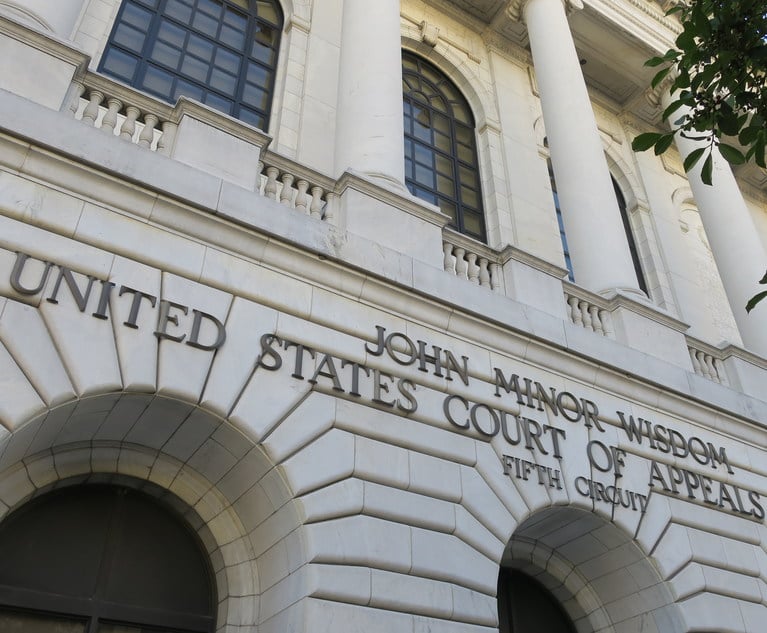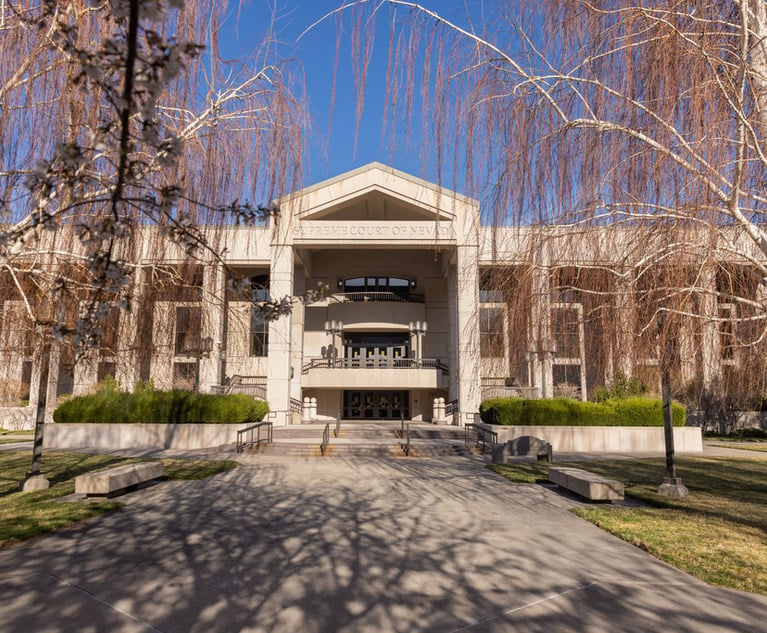Facing Lawsuit, Ex-Judge Urges Court to Strike Law to Protect Child Sexual Abuse Victims
Facing a sexual assault lawsuit, a former federal judge argues the state law allowing his victim to bring the case violates a state constitution.
December 18, 2017 at 02:36 PM
5 minute read

As the retirement of Ninth Circuit Judge Alex Kozinski amid sexual harassment allegations sends shockwaves through legal circles, a woman who claims she was the victim of another judge is fighting for her right to sue him.
Terry Mitchell alleges Richard Roberts, the former chief judge at the U.S. District Court for the District of Columbia, repeatedly forced her to have sex with him more than 30 years ago, when he was a 27-year-old prosecutor and she was a 16-year-old witness in a federal civil rights case. In a brief last week, Mitchell urged the Utah Supreme Court to uphold a 2016 state law that revived expired claims of child sexual abuse by allowing some victims to challenge alleged abusers in court. Roberts' lawyers argue expired claims cannot, under Utah law, be revived via legislation.
“Terry's case is a classic example of how a victim can basically be disabled from pursuing justice,” Mitchell's lawyer, Ross Anderson of Salt Lake City, said in an interview.
Mitchell filed her lawsuit against Roberts in federal court in Utah in March 2016, and he retired the same day citing medical reasons. Roberts has acknowledged he had an “intimate relationship” with Mitchell, but maintains the relationship was “entirely consensual.”
The case was referred to the Utah Supreme Court in June to decide the validity of the revival statute, known as HB 279. In his brief filed last week, Anderson wrote that HB 279 “provided a window of opportunity for some semblance of justice and accountability” for victims.
In their Dec.14 brief, Roberts' lawyers, who include Steptoe & Johnson's Brian Heberlig and Linda Bailey, wrote the Utah Supreme Court has consistently held claims cannot be revived via legislation once the statute of limitations expires.
They wrote that while the legislature can decide to strike a statute of limitation going forward, the Utah Constitution prohibits lawmakers from retroactively eliminating “a vested right” to a statute of limitations claim if it already expired.
“[Plaintiffs] do not explain how this vested right can be eliminated without placing in jeopardy all vested rights under Utah law,” the defense lawyers wrote. “And they do not offer a coherent distinction between the legislature's plenary power to eliminate the vested rights of defendants to be free from expired claims and its plenary power to eliminate other vested rights.”
Heberlig and Bailey declined to comment for this story.
Anderson said the law is clearly valid under a constitutional due process analysis, because the legislature had a legitimate goal in passing the law, and the law could reasonably achieve that goal.
“Nothing in the United States or Utah constitutions limits the ability of the Legislature to allow the victims of child sexual abuse to have a renewed chance to seek justice,” Anderson's Dec. 11 brief said. “Where the Legislature has carefully evaluated the interests of victims of child sexual abuse and defendants to determine that a revival of time-barred claims is necessary, the statute passes any test of constitutionality articulated by this court.”
HB 279 was intended to fix the previous statute of limitations, the brief said, because it “failed to provide a reasonable time for victims to pursue justice, causing countless victims to lose any opportunity for recourse to the courts.” Several other states, including California and Georgia, have enacted similar statutes.
The Utah lawsuit hasn't been the only attempt to hold Roberts accountable for the alleged abuse. He also faced a judicial misconduct case after the Utah Attorney General's Office filed a complaint against him early last year, but the U.S. Court of Appeals for the D.C. Circuit dismissed the complaint, citing Roberts' retirement.
When the D.C. Circuit Judicial Council was asked to review the dismissal, Chief Justice John Roberts sent the case to the Tenth Circuit. That court dismissed the complaint Nov. 30 on the grounds that the alleged misconduct took place before Roberts was a judge.
Anderson disagreed with the ruling, and said that in addition to the civil lawsuit, more should be done to hold Roberts accountable, such as disbarring him and holding congressional oversight proceedings.
“[Roberts can] collect a full salary for the rest of his life. He's basically been rewarded in a really perverse way for his sexual abuse of Terry Mitchell,” Anderson said.
The Utah Supreme Court is expected to hear oral arguments on the case, though it's unclear when they will take place. Once the court makes a decision on the validity of the statute, the case will likely return to the district court for further proceedings.
This content has been archived. It is available through our partners, LexisNexis® and Bloomberg Law.
To view this content, please continue to their sites.
Not a Lexis Subscriber?
Subscribe Now
Not a Bloomberg Law Subscriber?
Subscribe Now
NOT FOR REPRINT
© 2025 ALM Global, LLC, All Rights Reserved. Request academic re-use from www.copyright.com. All other uses, submit a request to [email protected]. For more information visit Asset & Logo Licensing.
You Might Like
View All
Legal Issues to Watch in the US Appeals Courts in 2025

Second Circuit Upholds $5M Judgment Against Trump in E. Jean Carroll Case
4 minute read
Divided 5th Circuit Shoots Down Nasdaq Diversity Rules

Nevada Supreme Court to Decide Fate of Groundbreaking Contingency Cap Ballot Measure
5 minute readTrending Stories
- 1In First Appeal of 2025, NY Top Court Eyes Ethics Watchdog, Cuomo's Book Deal
- 2Ex-Jenkens & Gilchrist Lawyer Convicted in Tax Shelter Scheme is Among Biden's Commutations
- 3Corporate Disclosure Law Enjoys ‘Presumption of Constitutionality,’ Feds Tell Justices
- 4Lawyers Are Watching These 3 Texas Cases
- 5How We Won: Samsung Defeats Data Breach Class Action
Who Got The Work
Michael G. Bongiorno, Andrew Scott Dulberg and Elizabeth E. Driscoll from Wilmer Cutler Pickering Hale and Dorr have stepped in to represent Symbotic Inc., an A.I.-enabled technology platform that focuses on increasing supply chain efficiency, and other defendants in a pending shareholder derivative lawsuit. The case, filed Oct. 2 in Massachusetts District Court by the Brown Law Firm on behalf of Stephen Austen, accuses certain officers and directors of misleading investors in regard to Symbotic's potential for margin growth by failing to disclose that the company was not equipped to timely deploy its systems or manage expenses through project delays. The case, assigned to U.S. District Judge Nathaniel M. Gorton, is 1:24-cv-12522, Austen v. Cohen et al.
Who Got The Work
Edmund Polubinski and Marie Killmond of Davis Polk & Wardwell have entered appearances for data platform software development company MongoDB and other defendants in a pending shareholder derivative lawsuit. The action, filed Oct. 7 in New York Southern District Court by the Brown Law Firm, accuses the company's directors and/or officers of falsely expressing confidence in the company’s restructuring of its sales incentive plan and downplaying the severity of decreases in its upfront commitments. The case is 1:24-cv-07594, Roy v. Ittycheria et al.
Who Got The Work
Amy O. Bruchs and Kurt F. Ellison of Michael Best & Friedrich have entered appearances for Epic Systems Corp. in a pending employment discrimination lawsuit. The suit was filed Sept. 7 in Wisconsin Western District Court by Levine Eisberner LLC and Siri & Glimstad on behalf of a project manager who claims that he was wrongfully terminated after applying for a religious exemption to the defendant's COVID-19 vaccine mandate. The case, assigned to U.S. Magistrate Judge Anita Marie Boor, is 3:24-cv-00630, Secker, Nathan v. Epic Systems Corporation.
Who Got The Work
David X. Sullivan, Thomas J. Finn and Gregory A. Hall from McCarter & English have entered appearances for Sunrun Installation Services in a pending civil rights lawsuit. The complaint was filed Sept. 4 in Connecticut District Court by attorney Robert M. Berke on behalf of former employee George Edward Steins, who was arrested and charged with employing an unregistered home improvement salesperson. The complaint alleges that had Sunrun informed the Connecticut Department of Consumer Protection that the plaintiff's employment had ended in 2017 and that he no longer held Sunrun's home improvement contractor license, he would not have been hit with charges, which were dismissed in May 2024. The case, assigned to U.S. District Judge Jeffrey A. Meyer, is 3:24-cv-01423, Steins v. Sunrun, Inc. et al.
Who Got The Work
Greenberg Traurig shareholder Joshua L. Raskin has entered an appearance for boohoo.com UK Ltd. in a pending patent infringement lawsuit. The suit, filed Sept. 3 in Texas Eastern District Court by Rozier Hardt McDonough on behalf of Alto Dynamics, asserts five patents related to an online shopping platform. The case, assigned to U.S. District Judge Rodney Gilstrap, is 2:24-cv-00719, Alto Dynamics, LLC v. boohoo.com UK Limited.
Featured Firms
Law Offices of Gary Martin Hays & Associates, P.C.
(470) 294-1674
Law Offices of Mark E. Salomone
(857) 444-6468
Smith & Hassler
(713) 739-1250










